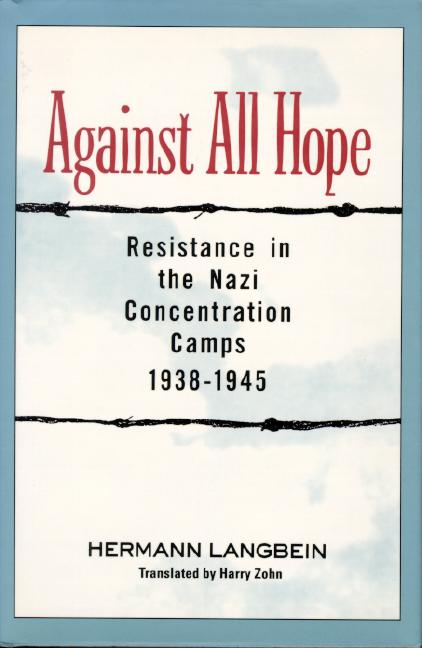"A valuable book that fills a void in the English language literature about concentration camps and especially resistance in the camps. Admirably objective and lucid, Langbein's book draws on his own personal experience and on his meticulous research. This is essential reading." --Henry Friedlander, editor of The Holocaust: Ideology, Bureaucracy, and Genocide
Well researched and written!
"Well researched and written. A chapter of
the Second World War entirely unknown to American readers. Resistance against
the Nazis in the most unlikely places can serve as evidence that there
will always be people to fight against tyranny, no matter how limited the
opportunities and how great the risk." --Lucjan Dobroszycki,
editor of Chronicle of the Lodz Ghetto 1941-1944
A truthful account...
"Up to now the full story of resistance in
all its details has never before been told. Langbein gives a truthful account
of what really happened . . . refutes misconceptions and legends. An important
history . . . bears witness to what we are capable of." --Eugen
Kogon, author of Theory and Practice of Hell
Inspiring and infomative!
"Inspiring and informative, this book fills
large gaps in what we know about resistance in the concentration camps."
--Kirkus
Reviews
An unforgettable testament
In this major and comprehensive work, hailed by Le Monde as a
"monumental study," Hermann Langbein shatters the myth that all prisoners
of concentration camps, during World War II, passively let themselves be
slaughtered. A prisoner himself and one of the leaders of resistance at
Auschwitz, Langbein painstakingly documents the detailed account of the
history of the camps and the story of the resistance. Spanning the initial
years to the chaotic weeks before liberation, Against All Hope is
the first systematic presentation of organized resistance. Deeply moving,
it is an unforgettable testament to the resilience and determination of
the human spirit.
Table of Contents
1. Introduction
The Conditions
2. The Concentration Camps from 1938 to 1945
3. The Self-Government of the Inmates
4. The Battle Between Reds and Greens
5. What Is Meant by Resistance?
6. Sources and Critique of Sources
7. Different Conditions and Changed Goals
The Actors
8. The Germans in the Resistance
9. The Role of the Communists
10. Social Democrats in the Resistance
11. The Special Role of the Austrians
12. The Poles
13. The Russians
14. Other Ethnic Groups
15. Groups in a Special Position
The Actions
16. The Saving of Lives
17. Against the Inhumanity of the System
18. Breaking Out of the Isolation
19. Escapes as Lifesavers
20. Resistance and Rebellion
21. Sabotage
22. Resisting Demoralization
The End
23. The End Is in Sight
24. The Liberation of the Concentration Camps
25. A Personal Word in Conclusion
Appendix
Notes
Bibliography
Index
HERMANN LANGBEIN was born in Vienna in 1912 and went to Spain in 1938 as a member of the International Brigade. He was interned in France, but was moved to Dachau in 1941 and then to Auschwitz in 1942. He is now Secretary of the International Concentration Camps Committee and has published numerous books on Auschwitz.
HARRY ZOHN, a native of Vienna, has translated numerous works from the German, including those of Freud, Walter Benjamin and Theodore Herzel. He is professor at Brandeis University and holds a Ph.D. in Germanic languages from Harvard University.






